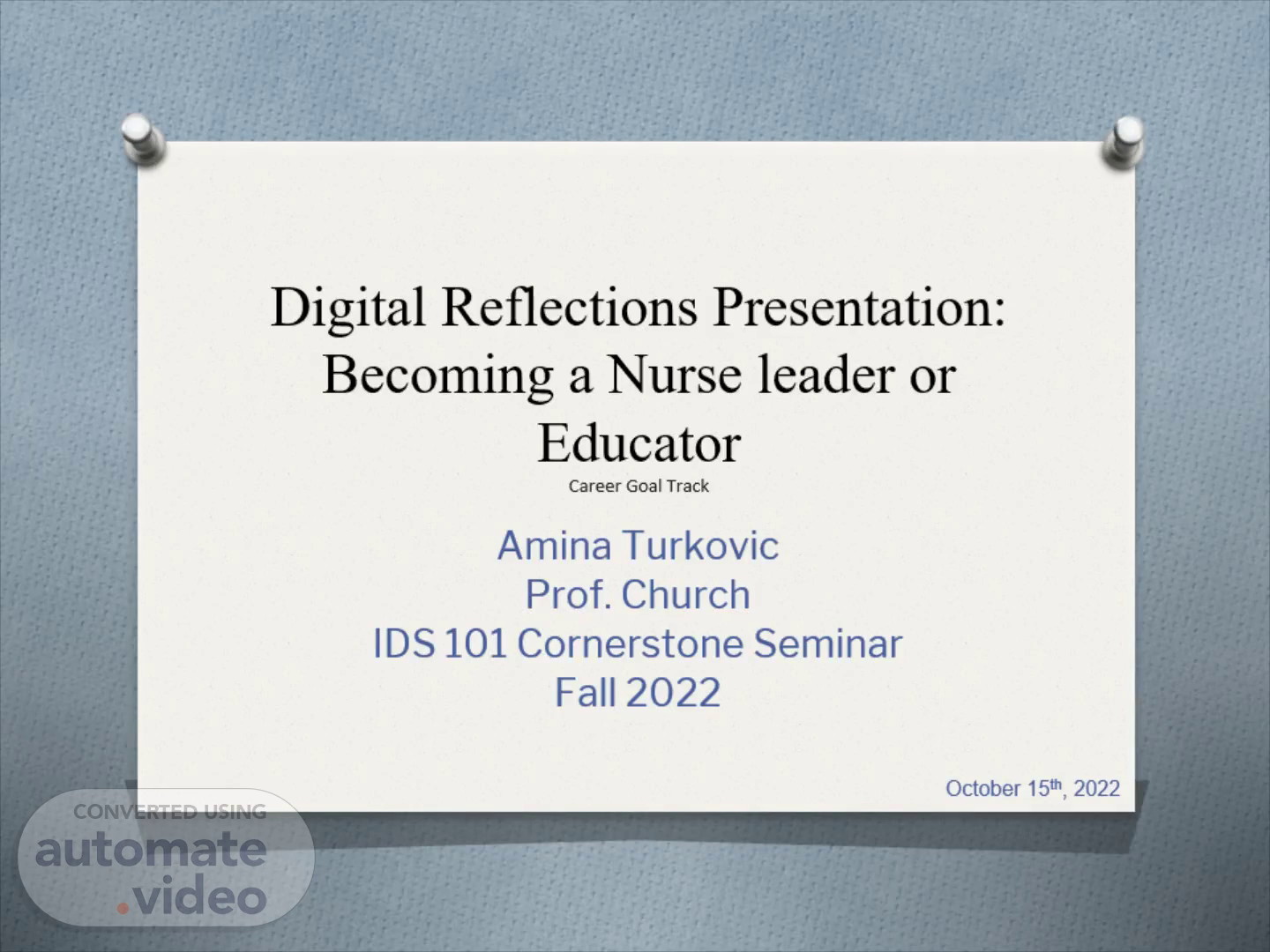
Digital Reflections Presentation: Becoming a Nurse leader or Educator Career Goal Track
Scene 1 (0s)
Digital Reflections Presentation: Becoming a Nurse leader or Educator Career Goal Track.
Scene 2 (11s)
Introduction. In healthcare, there are many positions an individual can hold. That is why my aspiration now is to become a nurse leader or educator. I was able to achieve my first goal at the age of 23, which was to become a registered nurse. In nursing, there are many opportunities to grow such as in leadership and educational positions, obtaining higher-level education degrees, and helping more individuals every day. Nurse leaders and educators are highly regarded within the healthcare system in which they have an influence on nursing staff practices and patient care outcomes through retaining nurses, preventing burnout, providing adequate and safe care, and preserving the nursing profession..
Scene 3 (1m 22s)
Describe your Career Aspiration and why it is Important.
Scene 4 (2m 58s)
The Body: The Main Points in Support of your Thesis.
Scene 5 (4m 33s)
Counterargument and Solution. My counterargument pertains technology and online education. Technology has recently been brought into healthcare and many nurses are not familiar with it. This can raise the question of, do nurse educators have the proper and required skills needed to teach new nurses in this new era of online learning? A solution I have found from this through research in order to respond was certain healthcare institutes have incorporated additional and necessary courses in order for nurse educators to become proficient in delivering educational correctly online..
Scene 6 (5m 48s)
Which Skills Have you Gained?. The skills I have already acquired are: T ime management C ompassion Empathy Teamwork These skills will allow me to connect to my patients more, provide quality and safe care, and be successful in my future..
Scene 7 (6m 3s)
Which Skills Do you Want to Develop?. The skills I would like to develop that pertain to my career are: Critical thinking Conflict resolution Effective communication All of these skills I need to learn will not only help me with my remaining requirements but also it will help me in my career and in my life to become a more well rounded individual..
Scene 8 (6m 23s)
Resources at COSC. Resources I think I will be able to utilize are : A cademic advisors- when I need assistance with registering, proper information of how academic requirement help to reach my career goal, and require help with the development of my educational path F inancial aid- this will assist with decreasing stress about finances so I am able to put all of my focus on my schoolwork and achieving my career aspiration C areer opportunities- receiving this education and being in contact with certain professors and advisors they can assist and notify me of any career opportunities that are present that will assist with me achieving my career goal I have found these to be the most helpful due to the fact that they can all lead me and assist me with staying on the correct path needed to achieve my goal..
Scene 9 (6m 57s)
Conclusion. Nurse leaders and nurse educators aid with retaining nurses, safe patient care, preventing nurse burn out, and preserve the nursing profession by educating and supporting future nurses. Even though there is doubt in whether these leaders and educators are qualified in this era of technology, there will always be opportunities to grow and learn. Becoming a nurse leader or educator requires dedication and demanding work but, I will be able to provide help to many people..
Scene 10 (8m 5s)
Reflections on the Course. T his course has helped me by it allowed me to learn what academic writing and reading truly is T he research paper helped me learn what my true goal in life is and how I would be able to achieve such. Also, it taught me how to develop and analysis my thoughts into actual words. Therefore, it will allow me to develop my thoughts in a more organized and consistent fashion that I will be able to bring with me in the future..
Scene 11 (8m 52s)
References. “Adams, J. M. (2018). Influence of Nurse Leader Practice Characteristics on Patient Outcomes: Results from a Multi-State Study. Nursing Economic$, 36(6), 259–267. Fitzpatrick, T. A., & Valentine, N. M. (2021). Dealing with COVID-19 Post-Traumatic Stress: Strategies for Preserving the Nursing Workforce and Supporting all Vital Frontline Personnel. Nursing Economic$, 39(5). Jobst, S., Lindwedel, U., Marx, H., Pazouki, R., Ziegler, S., König, P., Kugler, C., & Feuchtinger, J. (2022). Competencies and needs of nurse educators and clinical mentors for teaching in the digital age - a multi-institutional, cross-sectional study. BMC Nursing, 21(1), 240. https://doi.org/10.1186/s12912-022-01018-6 Jones, D. P., & Wolf, D. M. (2010). Shaping the Future of Nursing Education Today Using Distant Education and Technology. ABNF Journal, 21(2), 44–47. Ma, Y., Faraz, N. A., Ahmed, F., Iqbal, M. K., Saeed, U., Mughal, M. F., & Raza, A. (2021). Curbing nurses' burnout during COVID-19: The roles of servant leadership and psychological safety. Journal of nursing management, 29(8), 2383–2391. https://doi.org/10.1111/jonm.13414 Marufu, T. C., Collins, A., Vargas, L., Gillespie, L., & Almghairbi, D. (2021). Factors influencing retention among hospital nurses: systematic review. British Journal of Nursing, 30(5), 302–308. https://doi-org.cosc.idm.oclc.org/10.12968/bjon.2021.30.5.302.
Scene 12 (9m 58s)
Works Cited/References. Cite all the works that you have used in this presentation (Cite the works you have quoted from, paraphrased, and summarized in the APA style.) All the images used in this presentation are taken from Pexels . They are licensed under the Creative Commons Zero (CC0) license (Pexels). CC0 License Learn About the Creative Commons Licenses (Creativecommons.org).